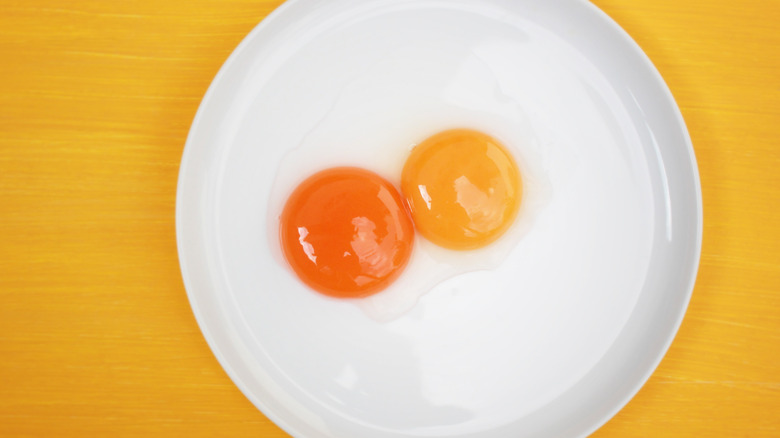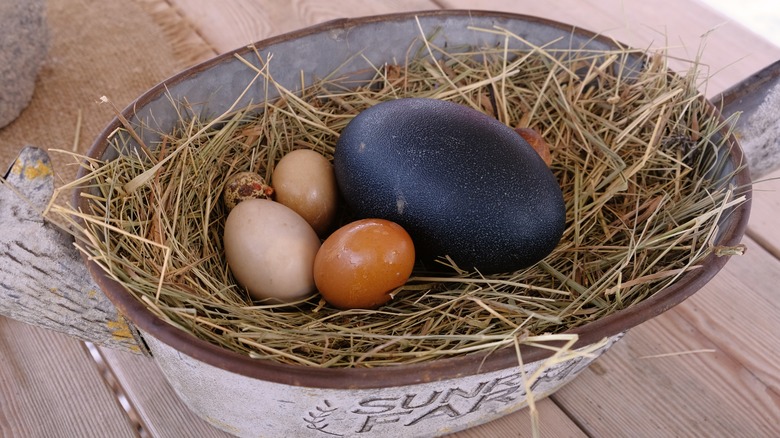The Best Deviled Eggs Come From An Unlikely Source
From baby shower brunches to Super Bowl parties, deviled eggs are the hors d'oeuvre you can seemingly never make enough of. This essential hard-boiled egg dish can trace its origins all the way back to ancient Rome. By the middle ages, cooks in Spain caught on to the idea of mashing the yolks with herbs and spices to make a seasoned filling (via "Eggs in Cookery"). However, the decadent deviled eggs we know today didn't catch on until the 19th century with a recipe from Fannie Farmer's "Boston Cooking-school Cookbook" that included mayonnaise as a binder in the mashed yolk filling.
As a dish with a serious historical pedigree, stuffed eggs have been reinterpreted to incorporate ingredients and spices from around the world. When the dish evolved, so did the name. When stuffed eggs became popular in 18th-century America, the term "deviled" was used to refer to spicy foods (which were hot like the devil). The label was naturally applied to stuffed egg recipes that used heavy amounts of spice.
Later on, any spiced egg dish became known as deviled. By the late 20th century, "deviled eggs" came to describe the cold egg dish we all recognize, as per "Eggs in Cookery." Don't think the innovation stops there, however. As cooks continue to experiment with the dish, we've found one ingredient source that's guaranteed to yield the best deviled eggs.
Duck, duck, deviled
Elevating a dish starts with assessing the ingredients, and with deviled eggs, we think that the egg naturally comes first. If you want amazing deviled eggs, then it may be time to forgo regular chicken eggs and opt for duck eggs instead.
The folks at Keto Babble claim that not only are duck eggs bigger than conventional chicken eggs, but they're also better for you. Duck eggs are a great substitute for chicken eggs because they have less water and more fat, affirms WebMD. They also contain more antioxidants, essential nutrients, omega-3 fatty acids, and protein. Though both chicken and duck eggs are highly nutritious, the higher fat and protein in duck eggs make them lower-carb, calorie-dense, and nutrient-rich. That's just about perfect for maintaining a keto-friendly diet.
Additionally, the deep, dark-yellow yolk of duck eggs has more flavor than chicken eggs. The high-fat yolks impart a rich umami flavor to any dish and are especially perfect for yolk-centric deviled eggs. However, their unique taste and texture also make duck eggs great for baking. The fat helps baked goods rise, producing lighter, fluffier confections. The only tricky part when it comes to substituting duck eggs for chicken ones is the size difference. Typically, a serving of three duck eggs is equal to that of four chicken eggs (via WebMD). But with recipes like deviled eggs, duck and chicken eggs are virtually interchangeable.
The legacy of deviled eggs
In other parts of the world, deviled eggs have undergone unique cultural and regional adaptations. "Eggs in Cookery" gives insight into a couple of different international interpretations, including a recipe from Spain for stuffed eggs that features shrimp or salmon-filled eggs that are baked or sometimes deep-fried. A Swedish version of the classic dish includes a heavy amount of anchovies in the filling and is flavored with curry or gravlax.
An Australian remix follows the trend of using alternative eggs, but instead of chicken or duck, Aussie cooks might substitute an emu egg. These dark green eggs can come in at 10 times the size of chicken eggs and contain a higher proportion of fat to water, meaning they are even richer and more nutritious than their chicken and duck counterparts (via American Emu Association).
As deviled eggs continue to be a staple at parties and potlucks everywhere, people will continue adding their spin to the classic dish. Duck eggs are a great jumping-off point for creating the premium deviled egg, but experimenting with alternative eggs, unique spices, relishes, and additional mix-ins open the doors to a world of seemingly infinite flavor possibilities.


